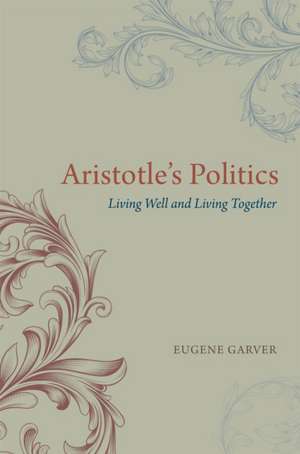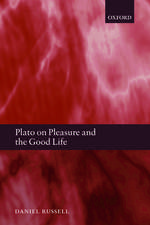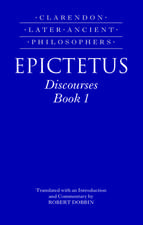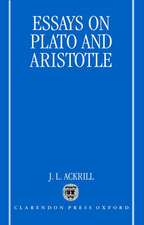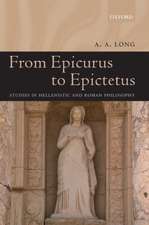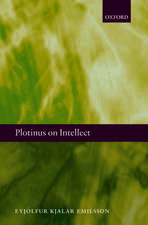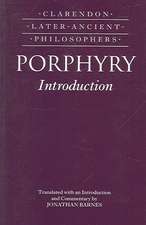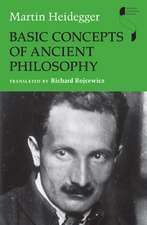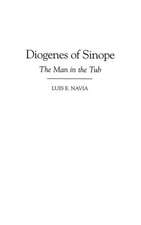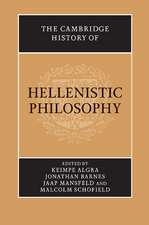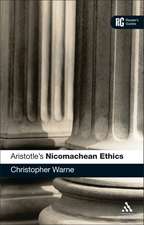Aristotle's Politics: Living Well and Living Together
Autor Eugene Garveren Limba Engleză Paperback – 4 apr 2014
Close examination of Aristotle’s treatise, Garver finds, reveals a significant, practical role for philosophy to play in politics. Philosophers present arguments about issues—such as the right and the good, justice and modes of governance, the relation between the good person and the good citizen, and the character of a good life—that politicians must then make appealing to their fellow citizens. Completing Garver’s trilogy on Aristotle’s unique vision, Aristotle’s Politics yields new ways of thinking about ethics and politics, ancient and modern.
Preț: 239.27 lei
Nou
Puncte Express: 359
Preț estimativ în valută:
45.80€ • 49.76$ • 38.50£
45.80€ • 49.76$ • 38.50£
Carte tipărită la comandă
Livrare economică 21 aprilie-05 mai
Preluare comenzi: 021 569.72.76
Specificații
ISBN-13: 9780226154985
ISBN-10: 022615498X
Pagini: 312
Dimensiuni: 152 x 229 x 20 mm
Greutate: 0.42 kg
Editura: University of Chicago Press
Colecția University of Chicago Press
ISBN-10: 022615498X
Pagini: 312
Dimensiuni: 152 x 229 x 20 mm
Greutate: 0.42 kg
Editura: University of Chicago Press
Colecția University of Chicago Press
Notă biografică
Eugene Garver is the Regents Professor of Philosophy Emeritus at Saint John’s University and adjunct professor of philosophy at the University of Minnesota. His most recent books include Aristotle’s Rhetoric: An Art of Character and Confronting Aristotle’s Ethics: Ancient and Modern Morality.
Cuprins
Acknowledgments
Abbreviations of Aristotle’s Works
Introduction: Aristotle’s Politics: Living Well and Living Together
I. Six Chapters to Living Well and Living Together
II. Politics IV.1–2: The Four Kinds of Best and Aristotle’s Four Causes
III. Ethics and Politics
IV. What Can the Politics Tell Us About Politics?
1. Book I: Slavery and the Will to Power
I. Slavery: Incomplete Actions and Incomplete Souls
II. Slavery and Slavishness
III. Despotism
IV. Slavery, Despotism, and Human Nature
V. Natural Rulers, Political and Despotic
VI. Thumos: Domination and Friendship
VII. Aristotle’s Slavery and Contemporary Problems
2. Book II: Aristotle’s State as a Work of Art
I. The Ideal State and Its Problems
II. Property and a Unified Polis
III. Private Property, Ancient and Modern
IV. Property versus Education as a Unifying Force
V. The Modesty and Ambition of the Politics
VI. Politics as Practical, not Productive
VII. From the Preface to Politics to Politics Itself
3. The Justice of Book III and the Incompleteness of the Normative
I. Aristotle versus Liberalism: The Right and the Good
II. The Meaning of “Form” in Politics III
III. The Definition of “Citizen”: Politics III.1–3
IV. The Good Man and the Good Citizen: Politics III.4–5
V. The Kinds of Constitutions: Politics III.6–8
VI. Justice as Proportional to Merit: Politics III.9–13
VII. The Rule of the Best versus the Rule of Law: Politics III.14–18
VIII. Conclusion
4. Practical Knowledge and the Four Orientations to the Best
I: The Kinds of Constitutions: IV.3–10
II: Polity and the Best in General
III. The Best in Particular Circumstances: Chapters 12–13
IV. Formal Possibilities and the Best in Particular
Circumstances: Chapters 14–16
V. Conclusion
5. Factions and the Paradox of Aristotelian Practical Science
I. Asymmetries, Epistemological and Ethical
II. Faction and Constitutional Change
III. Book V.1–4: Faction in General
IV. Book V.4: A Fifth Cause?
V. Book V.5–7: Faction and Particular Constitutions
VI. Book V.8–9: Preservation (and Improvement?)
VII. Preserving the Constitution and the Arts of Appearance
VIII. Stopping Factions versus Preserving the Constitution
IX. The Revolt of the Just
X. Political Philosophy: Inside or Outside the Polis?
XI: Philosophy and Phronesis: Logos and E¯thos
6. The Best Life and the Common Life
I. Book VII.1
II. Nature Versus Justice
III. Book VII.2
IV. Book VII.3
V. Book VII.4–7
VI. Book VII.8
VII. Book VII.13
VIII. Book VIII: Virtue and Music
IX. The Ideal and the Practical
Conclusion: People as Political Animals
Notes
Works Cited
Index
Abbreviations of Aristotle’s Works
Introduction: Aristotle’s Politics: Living Well and Living Together
I. Six Chapters to Living Well and Living Together
II. Politics IV.1–2: The Four Kinds of Best and Aristotle’s Four Causes
III. Ethics and Politics
IV. What Can the Politics Tell Us About Politics?
1. Book I: Slavery and the Will to Power
I. Slavery: Incomplete Actions and Incomplete Souls
II. Slavery and Slavishness
III. Despotism
IV. Slavery, Despotism, and Human Nature
V. Natural Rulers, Political and Despotic
VI. Thumos: Domination and Friendship
VII. Aristotle’s Slavery and Contemporary Problems
2. Book II: Aristotle’s State as a Work of Art
I. The Ideal State and Its Problems
II. Property and a Unified Polis
III. Private Property, Ancient and Modern
IV. Property versus Education as a Unifying Force
V. The Modesty and Ambition of the Politics
VI. Politics as Practical, not Productive
VII. From the Preface to Politics to Politics Itself
3. The Justice of Book III and the Incompleteness of the Normative
I. Aristotle versus Liberalism: The Right and the Good
II. The Meaning of “Form” in Politics III
III. The Definition of “Citizen”: Politics III.1–3
IV. The Good Man and the Good Citizen: Politics III.4–5
V. The Kinds of Constitutions: Politics III.6–8
VI. Justice as Proportional to Merit: Politics III.9–13
VII. The Rule of the Best versus the Rule of Law: Politics III.14–18
VIII. Conclusion
4. Practical Knowledge and the Four Orientations to the Best
I: The Kinds of Constitutions: IV.3–10
II: Polity and the Best in General
III. The Best in Particular Circumstances: Chapters 12–13
IV. Formal Possibilities and the Best in Particular
Circumstances: Chapters 14–16
V. Conclusion
5. Factions and the Paradox of Aristotelian Practical Science
I. Asymmetries, Epistemological and Ethical
II. Faction and Constitutional Change
III. Book V.1–4: Faction in General
IV. Book V.4: A Fifth Cause?
V. Book V.5–7: Faction and Particular Constitutions
VI. Book V.8–9: Preservation (and Improvement?)
VII. Preserving the Constitution and the Arts of Appearance
VIII. Stopping Factions versus Preserving the Constitution
IX. The Revolt of the Just
X. Political Philosophy: Inside or Outside the Polis?
XI: Philosophy and Phronesis: Logos and E¯thos
6. The Best Life and the Common Life
I. Book VII.1
II. Nature Versus Justice
III. Book VII.2
IV. Book VII.3
V. Book VII.4–7
VI. Book VII.8
VII. Book VII.13
VIII. Book VIII: Virtue and Music
IX. The Ideal and the Practical
Conclusion: People as Political Animals
Notes
Works Cited
Index
Recenzii
“Upending a truism, Garver finds Aristotle’s Politics more practical for us than his Ethics. In a work that is at once meditative and analytical, Garver leads us to realize that our actual, as opposed to our imagined, sense of the political can, upon reflection, give us a conception of the human good as substantive, shared, flexible, and multifaceted as Aristotle’s. In his refracted light we can see, as he did, that constitutions can be made morally better than the people in them and that under some conditions political stability is a moral good. Students and scholars of ancient philosophy, political theorists, and political scientists alike will find their minds turned around by this book.”
“Aristotle’s Politics deals insightfully, even masterfully, with the core philosophical issues that lie at the heart of our being as social and political animals. Whoever reads and studies this book carefully will grow in political subtlety and intellectual maturity, adding to his or her store of understanding the wisdom of a scholar who has spent years plumbing the meaning and the message of one of the landmarks of human inquiry.”
“In this elegant book, Garver approaches Aristotle’s Politics in a deeply satisfying manner: by constantly asking tough, intelligent, and living questions, both as a way of understanding what Aristotle was actually saying in this inherently foreign text, and as a way of connecting the Politics to political thought and action in our own very different world. All this is done with an extraordinary energy, fidelity, and intellectual honesty. An important and remarkable book.”
“Garver’s insightful book will challenge and inform every student of Aristotle, especially those students who are also teachers. His reading of the Politics is similar to Aristotle’s reading of the human condition in its subtlety, care, and openness to puzzle and perplexity. The central theme is captured in Garver’s subtitle: in what ways do the practices of humans living together both promote and threaten the prospects for human well being? Taken together, Garver and Aristotle illuminate for our reflection problematic elements of the Politics and of the human condition we modern readers are not likely to see without their help.”
“Eugene Garver has written an excellent book. He reads the Politics as a unified whole, and tries to think it through from beginning to middle to end. And he consistently does so with intelligence and sensitivity to detail.”
“Garver’s interpretation of the Politics makes for dense reading, but his study captures the complexity of the relations among political philosophy, practical wisdom, and political action in Aristotle’s own thought. The book concludes with an epilogue that focuses on what is central to this thought: the claim that human beings are political animals. In drawing out five different senses inwhich we can understand this claim, and especially by showing how the Politics itself informs enduring political questions, Garver thinks through the ways in which philosophy can be practical without being subsumed by practical ends. Garver’s fine study is clearly the fruit of deep reflection on this very problem.”
“Garver is a skillful interpreter, and it is a privilege to take note as he ruminates on questions most commentators never think to ask. . . . Highly recommended.”
“Garver explores frequently overlooked tensions in the work and refuses to accept easy solutions, but he keeps his sights set on how reading Aristotle ‘can help us think through our own problems.’ The result is a challenging and refreshingly distinctive treatment of the Politics.”
“Lord succeeds in heightening his original translation by honing in on certain expressions and sharpening passages in favor of readability and better access to the text.”
